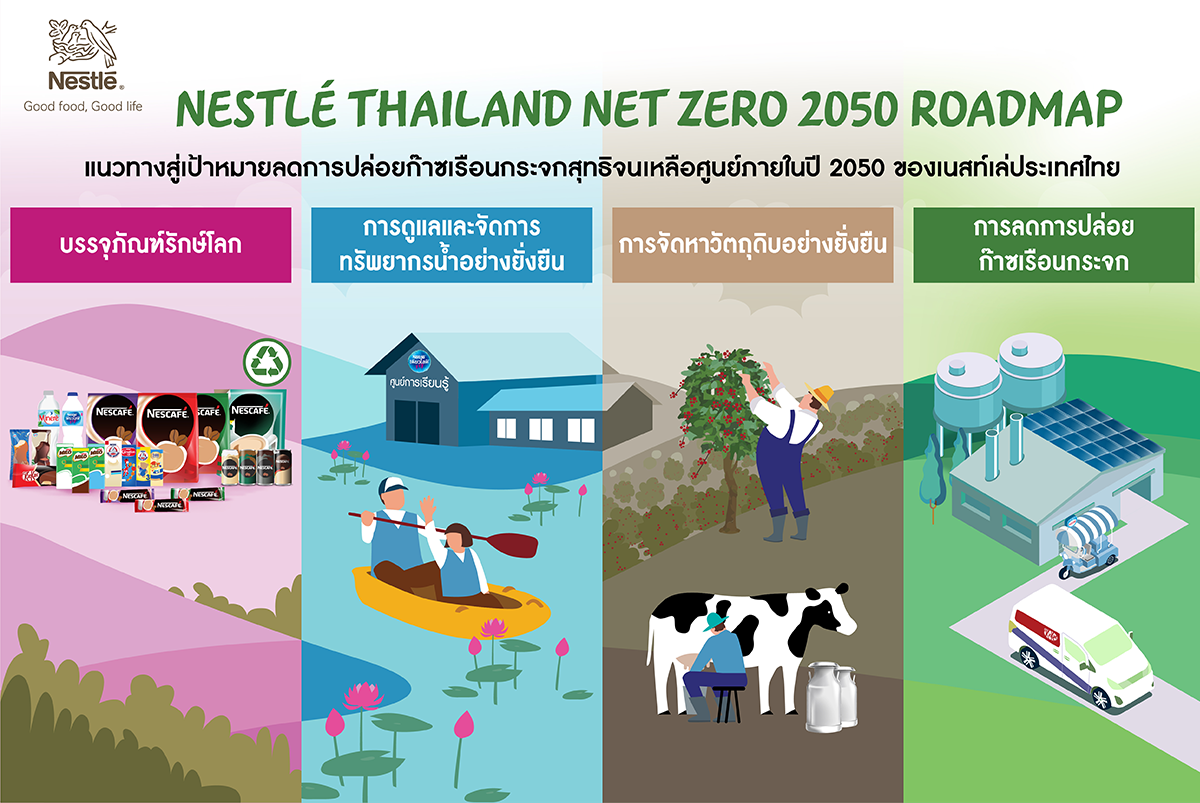Nestlé Thailand Announces Roadmap to Net Zero Greenhouse Gas Emissions by 2050

Nestlé Thailand today announced its roadmap to reach Net Zero greenhouse gas emissions by 2050. The plan, which focuses on four key pillars, will also help accelerate the transition to a regenerative food system.
Climate change is one of the biggest threats to society. Nestlé is determined to play a leading role in tackling climate change. As the world’s biggest food and beverage company, Nestlé exists to unlock the power of food to enhance quality of life for everyone, today and for generations to come.
"For more than 150 years, Nestlé has been the Good food, Good life company. We believe it is our responsibility to provide the world with tastier and healthier products. Intensifying challenges facing the planet today due to climate change are impacting the accessibility and availability of high quality and nutritious food. We must tackle this situation urgently. This is why Nestlé has established a sustainability roadmap. We will take concrete actions throughout our value chain to ensure sustainable food production to create a better Thailand and a better world for future generations," said Mr. Victor Seah, Chairman & Chief Executive Officer of Nestlé Indochina.
As part of this journey over the coming years, Nestlé Thailand’s local sustainability roadmap, which is comprised of four key pillars, will help the company reach its ambitious Net Zero 2050 commitment.
Pillar 1: Sustainable Packaging
Nestlé Thailand is committed to creating a waste-free future for tomorrow’s generations. This is aligned with Nestlé’s global ambition to have 100% of its packaging designed for recycling by 2025. Already in Thailand, 90% of its packaging is designed for recycling with concrete plans in place to get to 100% by 2025. Nestlé Thailand will also reduce the amount of virgin plastic the company uses by one-third by 2025, in line with Nestlé’s global ambition.
These pledges have already been backed up with actions. Over 500 million plastic straws have been replaced with paper straws in 2021, including the first bendable straw for a UHT product in Thailand. Nestlé has also redesigned its plastic sachets to make them easier to recycle by replacing complex materials with an innovative monostructure plastic packaging.
Nestlé will save 470 tons of virgin plastic this year with these and other initiatives including replacing plastic bags for sachets with paper ones, wrapping its ice creams in the first-ever paper wrapper without any plastic coating in Thailand’s ice cream market, and reducing the amount of plastic in water bottles and shrink film to keep products safe during transportation. Also, NESCAFÉ Ready-To-Drink cans are now 100% aluminum which is fully recyclable in Thailand.
Pillar 2: Water Stewardship
Nestlé takes care of water resources sustainably both in its factories and surrounding communities. Nestlé Thailand will continue to improve the water efficiency of its factories. Compared to 2018, the amount of water used per ton of product has been reduced by 4.8%.
Nestlé’s waters business has pledged to become ‘water positive’ from 2025 onwards. This means that at each site, Nestlé will replenish more water than it uses. Nestlé’s two water bottling factories are the only ones in Thailand certified by the Alliance for Water Stewardship, a globally applicable framework for sustainable water management within a specific catchment area. It recognizes companies that take concrete actions to help protect shared water resources and collaborate with local communities.
This work builds on several years of actions in Thailand to promote water stewardship. The Youth Water Guardian program – initiated seven years ago in partnership with civil society, local communities, and the local government – educates residents and students about how to protect and restore the water quality of the Kanomchin canal in Ayutthaya province with a learning center established at Saklee Wittaya School beside the canal.
This has made a positive impact on the lives of people in 13 villages in the area. A survey in collaboration with Phranakhon Si Ayutthaya Rajabhat University found improved water quality as a result of this effort. Several chemical and biological indicators show the improvement in water quality, such as biochemical oxygen demand and dissolved oxygen, along with an increasing amount of aquatic life including clams, river snails, and shrimp. Local residents now consume an incremental amount of up to 1.2 million cubic meters of the canal’s water compared to the past, especially for agricultural and aquacultural activities.
Pillar 3: Sustainable Sourcing
Sourcing sustainably is a key focus of the Nestlé Thailand plan, as it helps protect and regenerate the environment while ensuring that farming communities have the expertise and support to develop and thrive. In Thailand, Robusta coffee beans and fresh milk are now 100% sustainably sourced by the company.
A key initiative is the Nescafé Plan, which distributes coffee plantlets to farmers, transfers knowledge about good agricultural practices for growing coffee, and promotes intercropping techniques to increase biodiversity and restore soil fertility, so farmers can gain greater long-term yields. Each year, Nestlé provides training programs for over 2,000 coffee farmers in Thailand. Since 2006, it has distributed over 3.5 million coffee plantlets to local farming communities and supported around 2,500 Thai coffee farmers to become certified to the international Common Code for Coffee Community (4C) sustainability standard.
The company is also driving regenerative agriculture practices; for example, in the fresh milk sources supply chain. Nestlé provides training and supports farmers to manage and improve dairy cattle nutrition to enhance the quality and quantity of raw milk they produce. Nestlé also educates farmers about improving farming practices to meet environmental standards and helps them access water sources and use alternative energy on their farms.
Pillar 4: Carbon Reduction
Many of the initiatives set out in this plan contribute to reducing carbon emissions in the company’s supply chain. In addition, Nestlé Thailand is taking concrete steps within its manufacturing and logistics footprint. The company is piloting the use of electric trucks for KITKAT logistics and electric tricycles for Nestlé ice cream products. Nestlé has targeted changing 41% of the company’s management fleet to be lower-emission vehicles by 2022. The company is also expanding the use of solar energy to move towards the goal of using 100% renewable energy by 2025.
This use of the latest environmentally friendly technology and implementing many ways to save energy, water, and reduce greenhouse gas emissions follows the 3R concept (Reduce, Rethink, Replace). At present, all Nestlé factories are zero waste-to-landfill.
According to Mr. Seah: “With the concrete actions we are taking under the four key pillars, we are confident that our ongoing sustainability roadmap will enable Nestlé Thailand to reach our target of reducing our carbon emissions by 20% by 2025, halving these emissions by 2030, and achieving Net Zero by 2050.”
“This is in line with our journey to move beyond ‘doing no harm’ to ‘Regeneration’ to create a positive impact on the food system at scale. Nestlé Thailand is helping to drive Nestlé’s global promise to support and accelerate the transition to a regenerative food system – one that aims to protect and restore the environment, improve the livelihoods of farmers, and enhance the well-being of farming communities. With our long-term commitment to Regeneration, we continue on our journey to creating a better world for generations to come,” he concluded.
To watch Nestle's sustainability roadmap video, visit: https://youtu.be/VB4Ra3vKMcg





